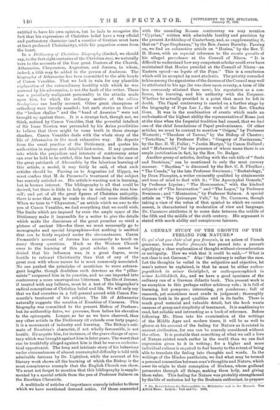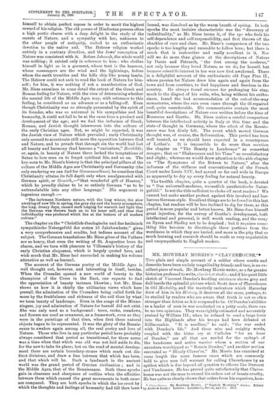A GERMAN STUDY OF THE GROWTH OF THE FEELING FOR
NATURE.*
Ce qui n'est pas clair n'est pas francais, is an axiom of French grammar, hence Parler franpais has passed into a proverb signifying a clear explanation of thought without circumlocution or ambiguity. How we wish that it could be said,—" What is not clear is not German." Alas ! the contrary is rather the case. Let the thoughts be veiled in the subjective and objective, let man's nature be explained, in that he must be either anthro- popathisch in seiner Geistigkeit, or anthropomorphisch in seiner Leiblichkeit, dm, and we have a good specimen of the ordinary run of a German didactic book. This present work is no exception to this perhaps rather arbitrary rule ; it is full of learning, but pompous ; interesting, yet ponderous ; full of research, yet sometimes most crude in judgment ; thoroughly German both in its good qualities and in its faults. There is much good material and valuable detail, but the book wants oneness of grasp and simplicity of treatment. It is maddening to read, but reliable and interesting as a book of reference. Before following Mr. Biese into his examination of the writings of the Middle Ages and modern times, it will be as well to glance at his account of the feeling for Nature as it existed in ancient civilisation, for one can be scarcely considered without the other. It is probable that something of what we call a love of Nature existed much earlier in the world than we can find expression given to it in writing ; for a higher and more individual culture is required to feel beauty to the extent of being able to translate the feeling into thoughts and words. In the writings of the Hindoo pantheists, we find what may be termed a personal connection between man's thoughts and Nature, which owes its origin to their conception of Brahma, whose godhead permeates through all things, making them holy, and giving them value. This feeling for Nature was probably strengthened by the life of seclusion led by the Brahmin enthusiast, to prepare 0 Die Enttrickelung des Naturgefiihls im Mittelalter und in der Neuzeit. Von Alfred Biese, Leipsig; Veit and Co. BM,
himself to obtain perfect repose in order to merit the highest reward of his religion. The old poems of Hindustan possess often a high poetic charm with a deep delight in the study of the secrets of Nature, and a sympathy with her, unknown to the other people of antiquity, united to an enthusiastic devotion to the native soil. The Hebrew religion worked entirely in a contrary direction, and the Jews' conception of Nature was consistent with it. Before Jehovah, the whole world was nothing ; it existed only in reference to him : who clothes himself in light as in a garment, whose tent is the heavens, whose messengers are the wind and the lightnings, before whom the earth trembles and the hills skip like young lambs. The Hebrew could not seek to read the book of Nature for him- self ; for him, it was nothing if not a manifestation of God. Mr. Biese examines in some detail the extent of the Greek and Roman feeling for Nature, with the view of determining whether the mental life of the Middle Ages may, with reference to this feeling, be considered as an advance or as a falling-off. Even though Christianity was so strongly permeated by the spirit of its founder, who was so universal in his sympathies and his
humanity, it could not fail to be at the same time a product and development of the age; and we find the influence of Greek, Roman, and Jewish thought interwoven into the culture of the early Christian ages. But, as might be expected, it was the Jewish view of Nature which prevailed ; early Christianity
only seemed to accentuate still more the opposition between God and Nature, and to preach that through sin the world had lost all beauty and harmony (had become a "caricature," Zerrhild); or, again, in beauty of Nature there lurked the temptations of Satan to lure man on to forget spiritual life, and so on. The key-note to Mr. Biese's history is that the principal pillars of the culture of the Middle Ages are Christianity and Germanity (the only rendering we can find for Germanenthum), he considers that Christianity attains its full depth only when amalgamated with German spirit, or Gemilllb,—"that wonderful gift of Heaven," which he proudly claims to be so entirely German "as to be untranslatable into any other language." His argument is ingenious enough :—
"The inclement Northern nature, with the long winter, the slow awaking of new life in spring, the grey sky and the heavy atmosphere, the lung, dreary days, caused such longing for warmth and light that the German was thrown back on to his inner self, and thus that individuality was produced which lies at the bottom of all modern culture."
The chapter on the " Christlich-theologische und des heidnisch sympathische Naturgefiihl des ersten 10 Jahrhunderts," gives a very comprehensive and erudite, but tedious account of the
subject. The German translations Mr. Biese gives of the Fathers are so heavy, that even the writing of St. Augustine loses its charm, and we turn with pleasure to Villemain's history of the early Christian eloquence, which is largely quoted here, and wish much that Mr. Biese had succeeded in making his volume attractive as well as learned.
The account of the German poetry of the Middle Ages is well thought out, however, and interesting in itself, besides.
When the Crusades opened a new world of beauty to the champions of the Cross in the East, one expects to find the appreciation of beauty increase likewise ; but Mr. Biese shows us how it is chiefly the utilitarian views which here prevail, the admiration of the Crusaders being called forth far more by the fruitfulness and richness of the soil than by what we term beauty of landscape. Even in the songs of the Minne- singers, joy and admiration of Nature for herself did not exist. She was only used as a background : trees, rocks, meadows, and flowers are used as ornament, as a framework, even as they were in the paintings of that time, when first these natural objects began to be represented. It was the glory of the Renais- sance to awaken again among all, the real poetry and love of Nature. Those who live in any particular period have probably always considered that period as transitional, for there never was a time when that which was old was not laid aside to die,
for the new to take its place; but on the road of mental develop- ment there are certain boundary-stones which mark out dis- tinct divisions, and draw a line between that which has been, and that which will be. Such a landmark in the ancient world was the grand period of Grecian civilisation ; and in the Middle Ages, that of the Renaissance. Both these epochs gain in clearness and sharpness of outline when the affinities
between them which caused the great movements in both cases are compared. They are both epochs in which the ice-crust by which the thoughts and feelings of humanity had till then been
bound, was dissolved as by the warm breath of spring. In both epochs the most incisive characteristic was the "discovery of individuality," as Mr. Biese terms it, of the ego who feels his self-dependence and self-responsibility, and first throws off the shackles of race and class. Mr. Biese's comparison of the two epochs is too lengthy and recondite to follow here; but there is much that is instructive and really excellent in it. Nor will we do more than glance at the descriptions of Nature by Dante and Petrarch, the first among the moderns," not only because they loved Nature, as we do, for herself, but because scientific interest in her was now first awakened. There is a delightful account of the enthusiastic old Pope Pius II., whose passion for Nature drew him again and again from the town and from courtiers, to find happiness and freedom in the country. He always found excuses for prolonging his stay, much to the disgust of his suite, who, being without his enthu- siasm, found the bad accommodation of the out-of-the-way monasteries, where the rain even came through the ill-repaired roof, quite unendurable. His commentaries contain the most beautiful descriptions of Nature ever written before the time of Rousseau and Goethe. Mr. Biese makes a careful comparison between the intellectual activity in Italy at this time and the state of thought in Germany, where the effect of the Renais- sance was but dimly felt. The event which moved German thought was, of course, the Reformation. This period has been well treated, as we should have expected in a countryman of Luther's. It is impossible to do more than mention the chapter on "The Beauty iu Landscape" as somewhat meagre ; that on" Shakespeare and his Time" as unsatisfactory and slight; whereas we would draw attention to the able chapter on "The Symptoms of the Return to Nature," after the influence of the stiffness and conventionality of the French Court under Louis XIV. had spread so far and wide in Europe as apparently to dry up every feeling for natural beauty.
The twelfth chapter, quite a quarter of the book, is devoted to " Das universell-moderne, wesentlich pantheistische Natur- gefilhl." Is not the title sufficient to choke off most readers ? We cannot but make another protest against this involved and bar- barous German style. Excellent things are to be found in this last chapter, but readers will be less inclined to dig for them, as this period is more popular and better known. Mr. Biese does himself great injustice, for the survey of Goethe's development, both intellectual and personal, is well worth reading, and the essay on Byron and Shelley not to be despised ; but it requires some- thing like heroism to disentangle these portions from the wordiness in which they are buried, and more is the pity that so much learning and research should be made so very unpalatable and unsympathetic to English readers.



















































 Previous page
Previous page